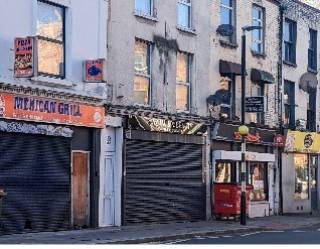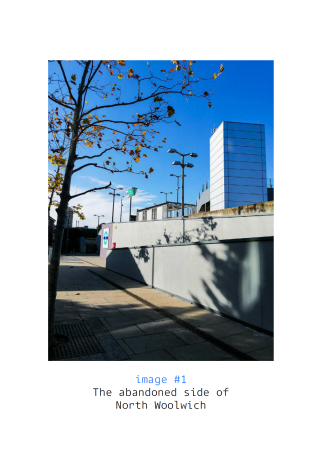Citizen scientists Terry and Twinkle reflect on the struggles of the local community in North Woolwich
Twinkle and Terry, two local residents and citizen social scientists from Beckton and Custom House, Newham, conducted research on the obstacles to prosperity that local residents in North Woolwich experience, as part of the Prosperity in east London 2021-2031 Longitudinal Study. These are their thoughts, images, and findings.
Poverty: reliance on food bank services and cuts to benefits
The Food Bank is what brings many people to the RADLAC (Royal Albert Docks Learning and Community Centre), just south of the King George V DLR station. Food bank employees have noticed a huge increase in the number of people relying on their services. Glynnis - who grew up in North Woolwich and has most of her family in the area - works as a coordinator at the Food Bank. Though she describes herself as having a good life, her concern is for her younger family and community members who have been less fortunate.
Speaking about her sister, who works a minimum wage job, Glynnis describes the struggles she faces:
“On paper she can live – in real life, she can’t live.”
When we met Glynnis, it was autumn 2021 and Universal Credit had just been cut by £20 per week. Though the cost of living crisis had yet to gain extensive media attention, Glynnis noted the gap between expectations of what a certain income should provide, and the reality of what people can afford:
“Because you know, they say you need X amount…but you go into a shop and every time you go into a shop, something’s [price has] gone up”
She describes how in her capacity as Food Bank coordinator, she has noticed an increase in the people coming in to use their services as well as a change in the types of people relying on the Food Bank; she says that more and more families with children are coming in, as well as younger, working age people. Several of the people we interviewed who were using the Food Bank told us they were doing so for the first time – indicating new levels of economic stress on the local community.
Lack of employment and discrimination
Employment and sufficient pay were key concerns for residents of North Woolwich. Some interviewees described how despite wanting to work and applying frequently for jobs, they faced discrimination based on their mental health, disabilities, and age.
Kathy, who currently lives in Woolwich-Arsenal spoke about her struggles finding work:
““I’ve been out of work for 13 years since 2008. So I’m trying to get back into work. But every application form I’ve sent in I’ve been rejected, because I’ve got a mental health problem as well. I hate it, I absolutely hate it. Sometimes I go home and cry…I go home and cry most days, because…if I go to an interview and tell them I’ve got a mental health problem, that’s it. They don’t want to know me after that”
Lesley shared these challenges finding employment. In her case, she attributed this to age discrimination because she is elderly. She cited this as a major barrier to her living a good life.
““[What would help would be] people not to be judgmental. Because when you fill in application forms, you don’t want to give out your birthday. But it won’t let you process the application form unless you do and then a company works out your date of birth …[and] you get turned down.”
Both women felt that discrimination prevented them from finding jobs, which in turn kept them from earning enough money to secure a good life, leading to their reliance on the Food Bank for basic necessities.
Abandoned and closed facilities
Near the RADLAC Food Bank is a Café, children’s playground, and a community allotment within St. John’s Green. But even in the middle of the day, it is often empty and attracts few customers. It does not have bathrooms, meaning that even those who work in the café are forced to go elsewhere to use the toilet. This has an impact on people’s desire to spend time in the café or work on the allotment.
Dave, a long-time resident of North Woolwich in his 60s or 70s, explains why the cafe seems dead:
““A lot of people don’t come here because there’s no toilet facilities for people to use, even for the gentleman that runs the cafe. You’ve got a children’s playground and they’ve got no toilets to use, unless they would go home or go to the RADLAC [which doesn’t operate on weekends]. It’s been like this since they opened it, you’ve got a little garden project there that the local people work on, and they’ve got no facilities to wash their hands or anything else.”
Other residents highlighted the closure of shops selling food and other necessary items. Lesley, who has lived in the area since 1987, spoke of how the community had lost several useful businesses, and linked this to gentrification and the construction of new flats:
““Shops are closing, and we need more shops, and more jobs so people can live a better life. It’s all well and good building nice houses and flats. But who can afford to live in them? If you ain’t got the shops then people aren’t going to move into the area. They’re gonna go where there’s...life”
A lack of jobs for local residents, unaffordable housing, and looming regeneration, all contributed to people moving out, shops closing down, and the overall degeneration of the area. Abandonment and neglect were visible in the built environment of North Woolwich. There were few, if any, open shops on the multiple trips Terry and Twinkle made to the area. Most were shuttered or empty.

Cafe' at St. John’s Green on a weekday afternoon

Closed shops on a Tuesday afternoon along Pier Road
Poor transport links
Though Woolwich is one of the stops on the newly launched Elizabeth line, North Woolwich is across the river and not directly connected. Residents still need to take the DLR, foot tunnel or a ferry to reach the Elizabeth line. Many residents used to rely on a local bus that helped them get where they needed, including to shopping areas where they could buy groceries and supplies. This bus line was removed, and despite many local petitions, TFL has refused to reinstate it. Dave observes:
“This is the only part of the Borough that needs two buses to get to all the shopping centres. If you’re a parent with a couple of kids and a pram, it’s not easy. Why are people in the area having to struggle to get two buses to get to the main shopping areas whereas you can live outside the Borough, miles away, and get one?”
Dave’s comments show a keen awareness of North Woolwich’s comparative isolation from the rest of Newham. His comparison with others “outside the Borough” highlights how unequal access to transportation shapes residents’ experiences of life in east London. Considering Kathy’s comments on the closure of shops, these observations on the difficulty of reaching nearby shopping centres are particularly urgent.
Youth crime
Residents also lamented the lack of activities for young people in the area, Dave contrasted this with his own childhood:
“When I was growing up around here there was two youth clubs to go to…there’s nothing for kids to do around here, they get into mischief.”
Further conversations with residents confirmed the feeling among many that the lack of youth activities was directly linked to crime levels. While scoping the area, Terry and Twinkle came across the Fight for Peace Academy along Woodman Street, which offers free sports facilities, education and leadership programmes, mentoring, and career guidance to combat youth violence in the community. Youth crime clearly appeared to be an issue, but it was unclear whether the Academy’s services alone were sufficient and what young people themselves thought about the role social infrastructure plays in reducing crime in their community.
If you could speak to a policymaker now, what would you say?
““Listen to what the people want in their area. Rather than keep on building and bringing new people in, improve the lives of the people who are already staying there. Wouldn’t that be much better than making new plans? Moving new people in is not going to help the area develop. You need to improve the quality of life already there”
Twinkle Jayakumar
““Listen to the people first, find out what they want - don’t assume to know, get people involved. People need community centres, shops, and supermarkets with food at reasonable prices. Pubs have become wine bars, restaurants have become delicatessens, locals are being priced out. You’re not keeping communities together who are earning a low wage, you’re pushing communities apart for too many people’s gains”
Terry Regan
 Close
Close


